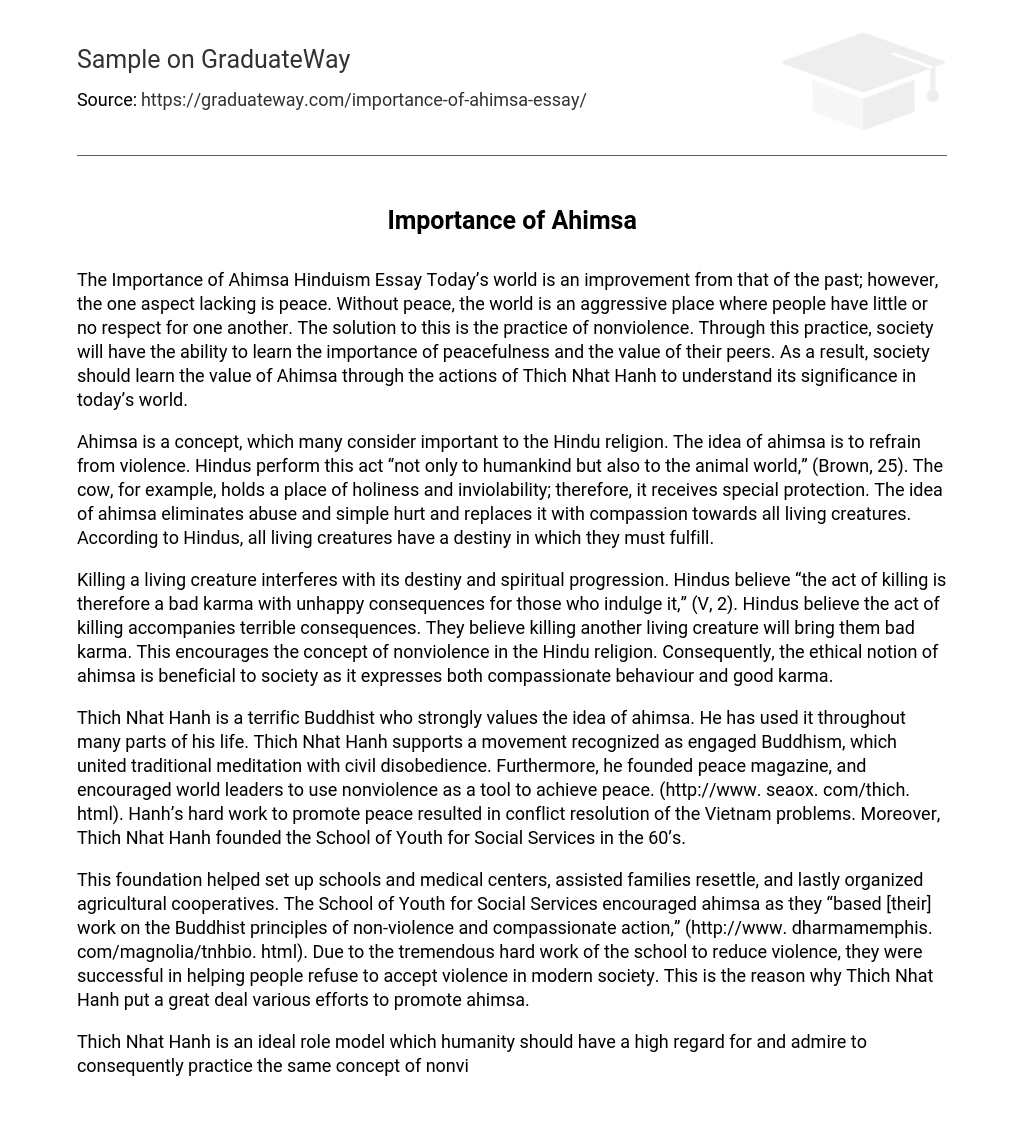Despite advancements in various areas, peace remains absent from today’s world. The lack of peace leads to a hostile and aggressive environment, where individuals do not show mutual respect. To address this issue, it is crucial to adopt nonviolence as a way of life. By practicing nonviolence, society can fully grasp the importance of peacefulness and appreciate the inherent worth of every human being. Thich Nhat Hanh’s actions provide society with a valuable example to understand the significance of Ahimsa in our contemporary era.
Ahimsa, a significant concept in Hinduism, entails abstaining from violence. As per Brown (25), Hindus abide by this principle not only towards humans but also towards animals. The cow is particularly revered and enjoys special protection. Ahimsa promotes empathy for all living beings and aims to eliminate mistreatment and injury. Hindus hold the belief that each living creature has its own unique destiny.
According to Hindus, causing the death of a conscious being disrupts its spiritual journey and development. Hindus perceive killing as resulting in unfavorable outcomes and negative karma. This belief fosters nonviolence within Hinduism by highlighting the significance of showing compassion and building up positive karma.
Thich Nhat Hanh, an extraordinary Buddhist, has deep reverence for ahimsa and incorporates it into various aspects of his life. He supports engaged Buddhism, a movement that combines traditional meditation with civil disobedience. Furthermore, Thich Nhat Hanh is the founder of peace magazine and strongly advocates for world leaders to utilize nonviolence as a means of achieving peaceful resolutions. Through his unwavering efforts in promoting peace, he played a pivotal role in resolving conflicts in Vietnam. Additionally, during the 60’s era, Thich Nhat Hanh established the School of Youth for Social Services.
Thich Nhat Hanh dedicated significant effort to advocating ahimsa, or non-violence, through different initiatives. The foundation he co-founded established schools and medical centers, aided in family resettlement, and coordinated agricultural cooperatives. One of his notable accomplishments was the establishment of the School of Youth for Social Services, which promoted ahimsa and compassionate action rooted in Buddhist principles. Their diligent efforts in diminishing violence effectively inspired individuals to renounce violence within contemporary society.
Thich Nhat Hanh, a remarkable role model, deserves the respect and admiration of humanity for his advocacy of nonviolent behavior. Violence is pervasive in contemporary society and manifests through acts of genocide and warfare. Genocide refers to the deliberate extermination of a specific group based on nationality, race, politics, or culture. Unfortunately, this form of injustice continues to exist in many countries today, as seen in Darfur, Sudan. The ongoing genocide in Darfur has resulted in the deaths of 400,000 people and displaced over 2,500,000 individuals (Darfur, 2).
The government’s lack of concern for societal issues has resulted in the perpetuation of violence and injustice in contemporary society. If the government were to adopt the principle of ahimsa, it could replace cruelty and unfairness with harmony and respect. The current conflict in Iraq, which commenced in March 2003, is another illustration of violence and injustice present in today’s world. This devastating war has caused immeasurable loss of life and inflicted lasting trauma on countless individuals. As of September 2004, the number of U.S. soldiers killed had reached a staggering total of 1,000.





